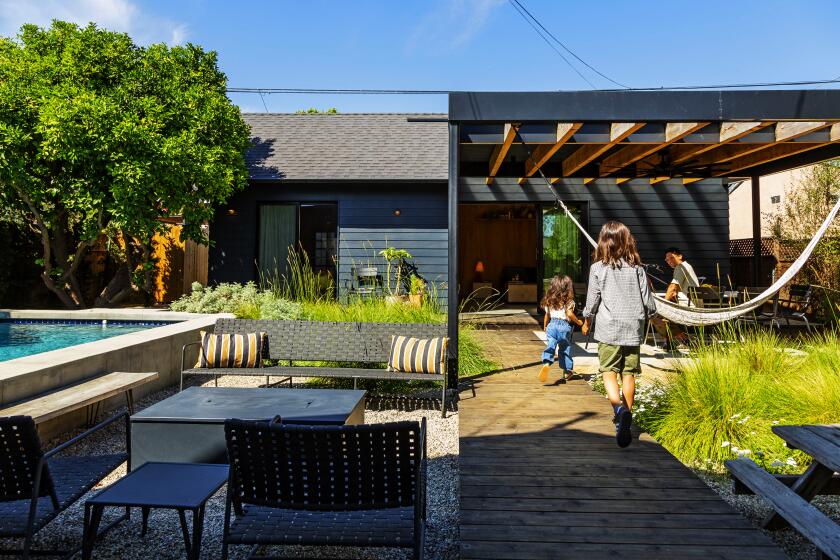The Making of Joseph Conrad’s ‘Nostromo’
- Share via
If it wasn’t for Oscar-winning writer Robert Bolt, “Mobil Masterpiece Theatre’s” ambitious six-hour adaptation of Joseph Conrad’s “Nostromo” may never have been made.
Set in the mythic South American city of Costaguana, “Nostromo,” published in 1904, is a sweeping story of greed, political upheaval and romance. The $20-million miniseries, which was shot in Colombia, offers an international cast including Colin Firth, Albert Finney, Serena Scott Thomas, Brian Dennehy and Claudia Cardinale. Italian actor Claudio Amendola plays Nostromo, the charismatic stevedore and hero of the people whose one major flaw proves to be a fatal one.
Executive producer Fernando Ghia became obsessed with “Nostromo” more than 20 years ago after Bolt, who wrote Ghia’s acclaimed 1986 film ‘The Mission,” asked him if he had ever read “Nostromo.”
Not only hadn’t he read it, Ghia had never heard of the acclaimed 1904 novel. Intrigued by Bolt’s description of Conrad’s epic, Ghia got a copy.
“It took me some time because it’s not exactly an easy thing to read. I found finally in the book exactly what Robert had told me about. The book is this kind of large, extraordinary canvas in which there are these multitude of characters of different classes coming from different places in the world who are united by greed.”
Bolt believed the complicated novel could be adapted into a two-hour feature. Ghia maintained ‘Nostromo” would lose its essence if squeezed into 120 minutes.
Ghia wasn’t the only filmmaker intrigued by “Nostromo.” The late director David Lean, who had collaborated with Bolt on “Lawrence of Arabia,” “Doctor Zhivago” and “Ryan’s Daughter,” announced in the late 1980s he was planning a feature version.
“David Lean was originally suggested to make ‘Nostromo’ by Robert Bolt,” Ghia says, laughing. “The same person who suggested it to me! Robert was a total fanatic about ‘Nostromo’ because it deals with the corruption of the human being and [tells] an extraordinary moral tale. This has been the main subject in the life of Robert Bolt.”
But Lean, even with the help of writer Christopher Hampton (“Dangerous Liaisons”) and Bolt, could not get the project off the ground. Meanwhile, Ghia set out on his own to do a TV miniseries.
“I found this writer in England and when I started to have a clear idea of what could be done, I went to the BBC,” Ghia says.
After making his arrangement with the BBC in early 1992, Ghia took writer John Hale on a monthlong trip to South America “to have him fully emerged in the world of ‘Nostromo.”’
Two years and four drafts later, Hale completed the script. “I don’t believe the book was properly edited by the author himself,” Ghia says. “The novel goes back and forth over 25 years. It doesn’t tell you the story in a straight line. The big thing [for Hale] to do was to tell the story in a line.”
Besides the BBC, Ghia also went into partnership with RAI in Italy, and TVE in Spain and WGBH Boston, the PBS station which presents “Masterpiece Theatre.”
Ghia decided not to take “Nostromo” to a commercial TV network because, he says, “they need another kind of material. “With ‘Nostromo,’ they would have been asking me naturally and legitimately to bend some of the characters and stories. If I choose to do Conrad, I want to do Conrad the way he is.”
“Masterpiece” executive producer Rebecca Eaton was eager to participate in “Nostromo.” “It’s very much in the ‘Mobil Masterpiece Theatre’ tradition of classic books adapted for the screen,” she says. “It’s a bigger book than a two-hour film. Therefore, it was perfect for miniseries TV.”
All major casting decisions were discussed with Eaton. “Michael Waring, the executive in charge of this production at the BBC, would call up and talk about who they were thinking of,” Eaton says. “We would go over various actors. We were obviously very concerned about the American character [of tycoon Joshua C. Holroyd] and I think they were very lucky to get Brian Dennehy to do it.”
In the casting of Amendola--popular in Italy but unknown in America--Eaton put her trust in Waring’s judgment. “Fernando brought that actor to Michael and he auditioned him,” she says.
Filming began in 1995 in Cartagena de Indias, Colombia. The production stretched over 20 weeks with a grueling six-day work week.
The majority of the lavish sets were built from scratch. “We built everything,” Ghia says. “We built the train and the railways. We built the silver mine. We built the ships. We built a jetty which was about 400 feet into the sea and on that jetty we built all the harbor facilities.”
The production ran into difficulties on a daily basis. “Everyday we had a tropical variation,” Ghia recalls. “Now a tropical variation for us was the certainty we had every day that something would happen which was not provided for. We had weather problems. We had every kind of problem.”
If it wasn’t for the enthusiasm and cooperation of the Colombians, Ghia says, “Nostromo” wouldn’t have been possible.
“You must realize I went there with a crew of 60 people, which is like going to war with three guys,” he says. “You need a crew of 150 guys. The whole point was to go there and work with them. I was perfectly aware that I was loading myself up with a lot of problems to start with, but it was the only way I could do it with the financing available. So I was prepared every day to face any of the problems. Once you know that you can handle the situation.”
“Mobil Masterpiece Theatre: Nostromo” airs Sunday-Tuesday at 9 p.m. on KCET.
More to Read
The biggest entertainment stories
Get our big stories about Hollywood, film, television, music, arts, culture and more right in your inbox as soon as they publish.
You may occasionally receive promotional content from the Los Angeles Times.











